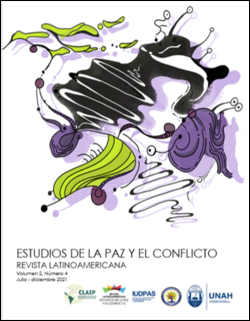Violence, conflict and omission in the protection of indigenous people in Brazil: the Veron case
DOI:
https://doi.org/10.5377/rlpc.v2i4.11481Keywords:
Human rights, indigenous people, hegemonic criminal justiceAbstract
The present article examines and analyzes the seriousness of the situation of selectivity and secondary criminalization of indigenous, especially the guidance directed to criminal, official and underground agencies, for the execution of massacres of indigenous people in Brazil. The methodology used includes bibliographic and documentary research and interpretation based on critical criminology. The object of knowledge addressed is the criminal action originated by the murder of Marcos Veron, indigenous leader in the State of Mato Grosso do Sul - Brazil, in which there were explicit remnants of structural violence rooted in the social control apparatus and in the decisions of institutions that should be impartial.
Downloads
638
HTLM (portugués) (Português (Brasil)) 95
XLM (portugués) (Português (Brasil)) 31
EPUB (portugués) (Português (Brasil)) 109
Downloads
Published
How to Cite
Issue
Section
License
The journal's contents are published under a Creative Commons Attribution 4.0 license (CC BY 4.0). This license allows third parties to share (copy and redistribute the material in any medium or format) and adapt (remix, transform and create from the material for any purpose, including commercial), as long as the authorship and first publication in this journal (Revista Latinoamericana Estudios de la Paz y el Conflicto, Universidad Nacional Autónoma de Honduras - Consejo Latinoamericano de Investigación para la Paz, DOI of the work) is acknowledged, a link to the license is provided and it is indicated if changes have been made to the original. The terms of the license are available online at http://creativecommons.org.




